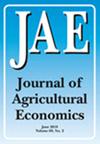Certification and Credibility: Do Seed Certification Systems in Uganda Help Signal Quality to Farmers?
IF 4.2
2区 经济学
Q1 AGRICULTURAL ECONOMICS & POLICY
引用次数: 0
Abstract
The value of purchased seed is a product of its underlying genetic information. However, farmers purchasing seed face a classic information asymmetry problem, as varietal identity is not directly observable. In this article we investigate the effectiveness of two certification systems in addressing this issue in the context of Uganda: the formal certification system (predominantly private sector) and the FAO's quality declared system (certification for seed produced mainly by farmers' groups). Using a large, nationally representative panel dataset spanning thirteen growing seasons, and controlling for time‐invariant household and plot‐level unobservables, we find that cultivating purchased quality declared improved seed results in measurable yield increases relative to saved seed. Surprisingly, however, certified improved seed is shown to provide no yield benefits over seed saved from previous seasons, despite its higher cost. Our findings suggest that input heterogeneity and information asymmetry in seed markets may be key constraints to the successful diffusion of improved maize varieties in Uganda, and that the formal seed certification system may not have provided an adequate signal of seed quality to farmers during the time period covered by the panel.认证和信誉:乌干达的种子认证系统有助于向农民发出质量信号吗?
购买种子的价值是其潜在遗传信息的产物。然而,农民购买种子面临着一个典型的信息不对称问题,因为品种身份不能直接观察到。在本文中,我们研究了两种认证体系在乌干达解决这一问题方面的有效性:正式认证体系(主要是私营部门)和粮农组织质量声明体系(主要由农民团体生产的种子认证)。使用跨越13个生长季节的大型、具有全国代表性的面板数据集,并控制了时间不变的家庭和地块水平的不可观测数据,我们发现,相对于保存的种子,种植购买质量声明的种子在可测量的产量增加方面取得了改善。然而,令人惊讶的是,经过认证的改良种子显示,尽管成本更高,但与前几季保存的种子相比,其产量并没有提高。我们的研究结果表明,种子市场的投入异质性和信息不对称可能是乌干达改良玉米品种成功传播的关键制约因素,并且在专家组所涵盖的时间段内,正式的种子认证系统可能没有向农民提供足够的种子质量信号。
本文章由计算机程序翻译,如有差异,请以英文原文为准。
求助全文
约1分钟内获得全文
求助全文
来源期刊

Journal of Agricultural Economics
管理科学-农业经济与政策
CiteScore
7.90
自引率
2.90%
发文量
48
审稿时长
>24 weeks
期刊介绍:
Published on behalf of the Agricultural Economics Society, the Journal of Agricultural Economics is a leading international professional journal, providing a forum for research into agricultural economics and related disciplines such as statistics, marketing, business management, politics, history and sociology, and their application to issues in the agricultural, food, and related industries; rural communities, and the environment.
Each issue of the JAE contains articles, notes and book reviews as well as information relating to the Agricultural Economics Society. Published 3 times a year, it is received by members and institutional subscribers in 69 countries. With contributions from leading international scholars, the JAE is a leading citation for agricultural economics and policy. Published articles either deal with new developments in research and methods of analysis, or apply existing methods and techniques to new problems and situations which are of general interest to the Journal’s international readership.
 求助内容:
求助内容: 应助结果提醒方式:
应助结果提醒方式:


